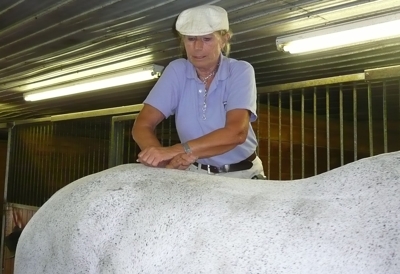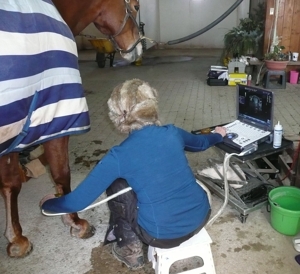*Mannington Equine is not currently providing any of these services*
* Watch this space for further updates*
Preventative Health Care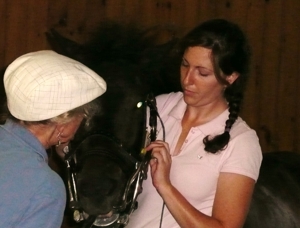
Preventative health care including Wellness Examinations and Dentistry, Vaccination and deworming – these are the visits that help to maintain and extend your horse’s wellbeing and life. Having a proper and comprehensive preventative health care program will help detect any problems early and help prevent future ones from developing. It is important to have a yearly oral exam and float if necessary. Some performance horses will require more frequent evaluation and treatment due to the intensity of work. The way horses’ are fed today differs drastically from the way they did for centuries before, now we feed them a significant percentage of concentrates and less hay. This impacts the way they chew and therefore the wear pattern of their teeth. Some horses will wear their teeth evenly and not develop any problems; however, many horses’ will wear their teeth unevenly and require a float to correct the abnormalities. Abnormalities of wear can lead to weight loss, difficulty riding and oral ulceration.
Vaccination
Vaccination is the most effective way to prevent against some of the prevalent diseases that result in high morbidity and mortality. Vaccination is never guaranteed to prevent clinical disease, only to help prevent it and lessen the severity of clinical disease if it does occur. There are several different types of vaccines – those based on a killed virus or bacteria, those that have had the virus or bacteria modified so it is less virulent, and live viruses or bacteria with decreased virulence. The purpose of vaccination is to prime the horse’s immune system so it is prepared if challenged by the natural disease. It is most important to vaccinate against diseases that have serious consequences and that we know to be endemic in the area. Tetanus and rabies are examples of two vaccines that are considered core vaccines and essential. There are other important and beneficial vaccinations. A vaccination program can be customized with your veterinarian.
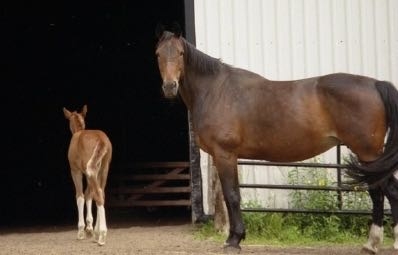
Deworming
Deworming regimes have not undergone a lot of change since paste wormer took over from tube worming that was done by the vet. Now we are starting into another ‘deworming revolution’. New research has shown that many horses do not shed high numbers of parasite eggs, and this fact is stable over time. What this means is that by doing a fecal examination we can characterize horses into low, medium or high shedders. What that translates into is different deworming protocols for each individual horse. This will reduce the amount of unnecessary deworming and help to reduce the incidence of parasite resistance.
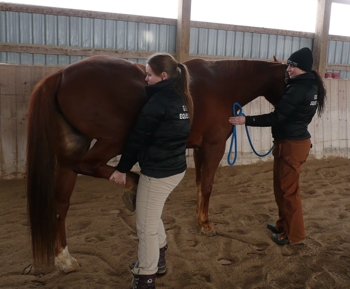
Lameness evaluation
There are many variations to a horse’s gait – some normal and some abnormal. It can be difficult to distinguish whether a horse is stiff, off or outright lame. A thorough lameness examination can help detect any subclinical problems and direct the diagnostic process in the event of an overt problem. We offer many years experience in assessing the lame or stiff horse. The primary physical examination is an important first step in determining potential or current problems. We can combine the thorough physical examination with advanced diagnostics.
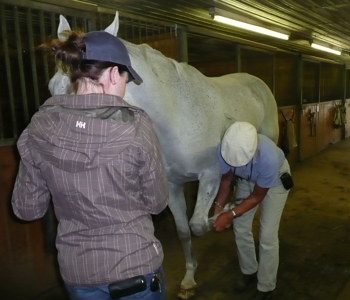 Prepurchase examinations
Prepurchase examinations
The old saying ‘don’t look a gift horse in the mouth’ – well, we think you should look every horse in the mouth, and all over for that matter, before you bring them home. Unfortunately the cheapest part of the horse is the purchase. Horses live much longer than dogs are more expensive to keep and are a significant responsibility. A thorough physical exam and soundness evaluation will give you important information regarding the current and future health of the horse. It can help determine the suitability of the horse for your chosen pursuits. Good quality x-rays taken at the time of purchase will not only help to provide information on any potential problems, they can be invaluable as a comparative tool in the event of a future issue.
Endoscopy
Endoscopy can be used to evaluate the upper airways and pharynx. Horses that have difficulty breathing or make a respiratory noise during exercise should have their airways examined to rule out any anatomical abnormalities.
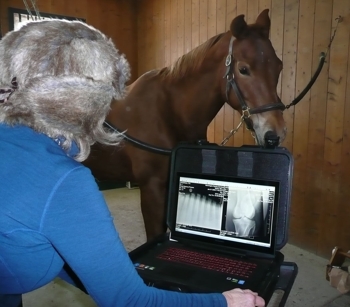 Digital Radiography
Digital Radiography
We now have the newest generation of wireless digital radiography technology. We can forward jpeg images directly to whomever the client chooses. Each new generation of technology has enhanced what can be seen. This newest system has been the largest step for capturing the best images.
Digital Ultrasound
We have a high quality digital ultrasound unit. It provides high quality images that can be stored in digital format. The multiple probes allow us to not only assess limbs but also to see deeper areas within the stifle, assess the lumbar and sacro-iliac area, assess necks, lungs and abdomen.
Complementary therapy (Integrative Therapy)
Complementary therapy can be a very useful adjunctive therapy to traditional treatments. It can support the performance horse, it can help improve the quality of life of geriatric horses, and it can boost overall health. We do not consider it a replacement for conventional veterinary medicine. However, there are many cases in which it has been irreplaceable in solving a problem. We offer manual therapy (chiropractic), acupuncture, osteopathy and herbal supplements.
